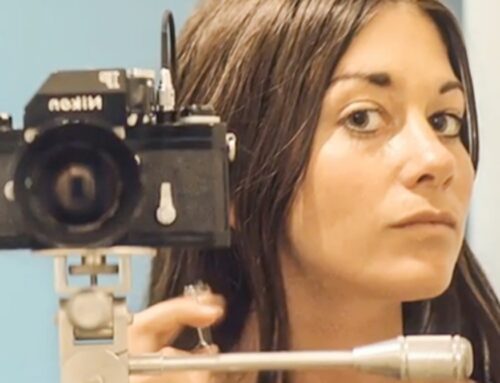As a true geek, Albert Einstein as always been one of my inspirations. What better way to inspire the artists and creators among us than to let my idol do the speaking.
In 1982, a physicist at the University of Paris, Alain Aspect discovered that when two subatomic particles become entangled on some cosmic level, they remain connected and are able to instantaneously “communicate” with each other regardless of the distance separating them. Actions taken by, or with regard to, one particle affect the other particle, I.e., if one particles spins, so does the other. This occurs regardless of whether they are 10 feet or 10 billion miles apart. Einstein found this discovery to be amazing. By some inexplicable force, each particle always seems to know what the other is doing and reacts accordingly. The mystery of this quantum physics phenomenon is that it violated Einstein’s long-held scientific tenet that the speed of sound, I.e., communications, cannot travel faster than the speed of light. Since traveling faster than the speed of light is tantamount to breaking the “time barrier,” this daunting prospect of entangled particles has caused some physicists to create elaborate circumventions in attempts to try and explain away Aspect’s findings. But it has inspired others to offer even more radical explanations for the existing facts. Einstein was so enamored with his initial observations about such quantum entanglements that he described them as “spooky action at a distance.” Perhaps this is the kernel of inspiration for Einstein’s some of the following quotes which offer the creative and entrepreneurial spirits among us some guidance:
more radical explanations for the existing facts. Einstein was so enamored with his initial observations about such quantum entanglements that he described them as “spooky action at a distance.” Perhaps this is the kernel of inspiration for Einstein’s some of the following quotes which offer the creative and entrepreneurial spirits among us some guidance:
1. Become Entangled.
“Every one sits in the prison of his own ideas. A human being is a part of the whole called by us “Universe,” a part limited in time and space. He experiences himself, his thoughts and feelings as some thing separated from the rest. A kind of optical delusion of his consciousness. This delusion is a kind of prison for us, restricting us to our personal desires and to affection for a few persons nearest to us. Our task must be to free ourselves from this prison by widening our circle of compassion to embrace all living creatures and the whole of nature in its beauty.”
Like the subatomic particles that seem inextricably connected, in this thought Einstein informs use that we are an intricate part of the universal whole. More than every before, most people in our individualist, self-interested society believe, as Einstein describes here, that we are separate “islands unto ourselves.” He describes this state as a “prison.” Instead, we are encouraged to “become entangled” with the universe and “embrace all living creatures.” While there is creative value to individual self-reflection, the most spontaneous creativity often happens when we collaborate and involve others in the flow of nature’s beauty. So, become entangled and “widen [y]our circle of compassion.”
2. Embrace Mystery.
“The most beautiful thing we can experience is the mysterious. It is the source of all true art and science.”
Einstein must of had quantum entanglement in mind when he made this observation that mystery is the most beautiful experience we can have. One only has to observe a toddler for a brief period of time to realize that for him or her, the whole world is new, is a mystery. As we grow into adults, we often lose the ability to view the world through the wonderous eyes of a toddler. We can become weary from life’s constant barrage of obstacles and grow embittered and cynical. But Einstein suggests that the artists and scientists among embrace that childlike feeling of wonderment as the source of our inspiration. He reminds us that art and science arises from new, mysterious ideas, a suggestion that our new, cynical world will tell you is false. Reject the trend that says to you that there are no new ideas and that everything is derivative, and embrace the mysterious.
3. A Simple Life is a Happy Life.
“A table, a chair, a bowl of fruit and a violin; what else does a man need to be happy?”
Our senses are bombarded on a daily basis with a barrage of information and sensory input. We live is a disposal world where everything we own can be replaced through Amazon through a one-touch purchase and arrive at our doorstep the next day, or the same day in some instances. We can now select what we want to eat for the week in an app and drive by the grocery store where its waiting to be delivered to our vehicle. Einstein suggest that the more complex our life becomes, the more distracted and, perhaps, less happy we become. What could be a simpler happiness than picking up your instrument, sitting in your favorite chair and immersing yourself in music as you munch on a peach! Uncomplicate your life and your creativity will flourish.
4. Envision the Future.
“Imagination is everything. It is the preview of life’s coming attractions. Imagination is more important than knowledge. For knowledge is limited to all we now know and understand, while imagination embraces the entire world, and all there ever will be to know and understand.”
This is one of Einstein’s most published and well-known quotes: “Imagination is more important than knowledge.” Of course, he didn’t mean to discredit education, which is why the introductory sentence to that famous quote leads to its understanding. According to Einstein, imagination is a glimpse into the future, “life’s coming attraction.” In the “incubator” world, we often call this imagination a “disruptive” idea, one that changes the course of an industry. Amazon disrupted retail sales. Spotify disrupted the music industry. Uber disrupted public transportation. OpenTable disrupted the restaurant business. This type of disruption happens when imagination is everything, even in the arts. Think of the impressionist movement in art: in a world of realistic reproduction in art, painting in dots was unique. In music, this kind of disruption has happened many times in many genres, including classical, jazz and rock ‘n roll! Free your imagination and envision your future.
5. Trust your gut.
“The only real valuable thing is intuition.”
This one is easy. Have you ever heard someone tell you to “trust you gut.” It’s one of those aphorisms that seems so simple as to be ridiculous, but it is truly one of life’s mysterious realities. Sometimes in life we feel a certain way, I.e., our guts tell us something, that cannot be explained by empirical observation or fact. A son feels a sudden sense of loss, for example, at the precise moment that his father passes many miles away. A sister or brother feels a sharp sensation in this hand at the exact moment his or her sibling pierces their skin with a knife in another state while cutting vegetables. We sometimes call it “intuition,” or may just a “feeling.” The more spiritual among us may call it a premonition. Whatever word you use to describe the phenomenon, it is a reality that resembles those “spooky moments” that Einstein described, when two subatomic particles are spinning in unison. As a creative, it may help to get in touch with the spooky side of life and trust your gut.
6. Think differently.
We cannot solve our problems with the same thinking we used when we created them.
7. Live as if every moment is a miracle.
“There are only two ways to live your life. One is as though nothing is a miracle. The other is as though everything is a miracle.”
Your glass is either half empty or half full. In his famous tome Odes, the epicurean Horace extoled “carpe diem, quam minimum credula postero.” If that’s Greek to you, roughly translated it means “seize the day, put little trust in the future.” More specifically, Einstein teaches use to embrace the moment as the miracle that it is, and live you life as if there is no tomorrow. This may be why the more creative souls among us tend to be “free spirits” and “impulsive,” with very little concern about the practicalities of life. Einstein believed that the work of God was “reflected in the harmony of nature’s laws and the beauty of all that exists.” Although history sometimes portrays him as the “absent-minded” professor, I choose to believe that he was just preoccupied with the miracles of life. The folklore of Einstein’s umbrella bears this out: it is said that one rainy day Einstein stopped by a shop to purchase supplies for a research project, where he lays the umbrella down to pay for the goods, and promptly forgets it as he walks back out into the rain. He returned to the store after the rain stopped. When the shop owner inquires about the odd behavior, Einstein explains that is was preoccupied with thinking about his research and only remembered the umbrella when the rain stopped and he tried to close his forgotten umbrella! So don’t let the details of our daily existence interfere with your creative thoughts. Life every moment as if it’s a miracle.






